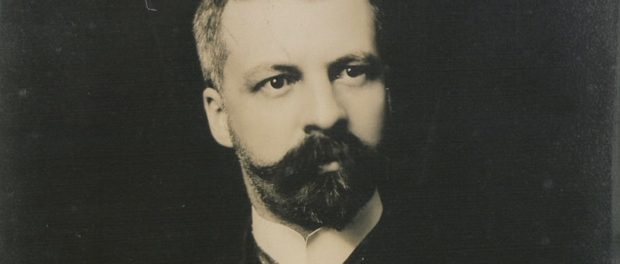1910: The First Bourassa & Other Quebec Curios
Part of “Shadows and Revolution”, 1900-1960
 Henri Bourassa, 1909, photographed by B. J. Hebert. Photo credit: British Library. Accession no: HS85/10/20553
Henri Bourassa, 1909, photographed by B. J. Hebert. Photo credit: British Library. Accession no: HS85/10/20553
Henri Bourassa’s lineage bears some mention: the Bourassa household was able to trace their ancestry back on both sides all the way back to the first settlers in New France, but it was Henri Bourassa’s grandfather that was the most important relative in the last century. Henri Bourassa was none other than the grandson of Louis-Joseph Papineau. The son of Papineau’s daughter Azélie, his mother died only six months after his birth. The youngest of his family, Henri Bourassa was educated in his early life by his very religious aunt, Ezilda. It is in his studies with her and his leisure times that he would learn about the two of the most important subjects that would shape his thought and would influence generations: the struggle of the English and the French and the lessons of the Church and its domination on society.
Bourassa briefly attended École Polytechnique but left after one month. Flirting with the idea of law school for a time, he went in and out of various religious schools before graduating from a school in the United States with a Classical education without the want to pursue the career of a priest. Politics soon called his name with his shock and opposition to the hanging of Louis Riel, considered by English Canada to be a traitor. Joining Laurier’s Liberals, he gained a seat in the House of Commons and around the same time started up a few newspapers that espoused Laurier the man and Liberal ideals.
Bourassa soon turned towards the provincial side of politics, unsatisfied with the way the provincial government was being run. Influenced by the way he had seen the rural side of Quebec work from his time as a child and a young man, Bourassa saw the way new things such as the Caisses populaires Desjardins were going and was impressed. Dissatisfied after a time in the Legislative Assembly, Bourassa turned back to his writing and started one of the most important newspapers in francophone society.
Le Devoir was first and foremost a newspaper with a nationalist slant. Towards the turn of the century, his sphere of influence led him to start encouraging French Canadians to rally around Canada rather than Britain in a move that was at one time anti-Imperialist but also pro-Canada. He studied what made French Canadians different from English Canada, concluding that their language, culture, and religion, specifically their Catholicism, made them different. Born a Catholic himself and influenced by Ezilda, Henri Bourassa adopted the stance that the Church ought to govern religious matters, a position called ultramontanism. Le Devoir, written by a team of writers, adhered to Bourassa’s strict quality control and each daily that was issued bore Bourassa’s ideas of a militant Catholic nationalist newspaper.
Bourassa’s career continued throughout the first half of the twentieth century until his death in 1952. He was a man with many sides. Urging the government to create a distinctly Canadian navy, he was nonetheless rigorously anti-conscription during World War I and World War II and his name was mercilessly slaughtered by English Canada because of these beliefs. Later on, he would be one of many that staunchly refused letting in immigrants, in particular Jews fleeing Nazi Germany, during World War II. Lionel Groulx, a fellow anti-immigration believer, was nonetheless an intellectual enemy of Bourassa for most of his lifetime, believing in separatism instead of nationalism.
Robert Bourassa, one of Quebec’s Premiers in the wake of the Duplessis era, is a distant relative of Henri Bourassa (fourth cousins twice removed).





